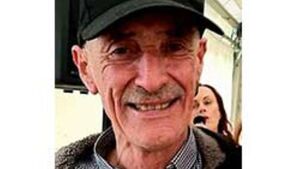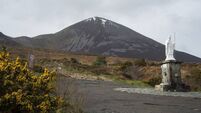Mayo islander drowned after car entered lake

Christy Henry died after his car entered a lake during stormy weather.
There was nothing suspicious about the death of a 61-year-old Inishbiggle man who drowned after his car entered a freshwater lake on the island, an inquest has heard.
An inquest at Ballina Courthouse into the death of Christy Henry was presided over by coroner Eleanor Fitzgerald and heard from several witnesses, including Sgt Noel Crinnegan, of Westport Garda Station, who read a statement from Alister Dickson, of Inishbiggle.
Mr Dickson said he brought Mr Henry over to Achill Sound to do some shopping at around 12.45pm on October 6th, 2023, and they returned to the island at around 3.30pm. Later, at about 8pm, Mr Henry visited him at his house and it was apparent he had consumed alcohol. At around 8.20pm, Mr Henry left the house and drove along the L5457 road towards Bullsmouth in his red Peugeot 206. Mr Dickson watched him go and saw him drive up the hill and out of sight.
In his statement, Mr Dickson said he then heard a “grave spin of the tyres” following which all went quiet. He got his searchlight, went up the hill and saw the tail lights of the car in a lake. He rang Mr Henry’s phone to no avail. He immediately contacted Malin Head Coastguard Rescue and then entered the water and swam out to the car.
“I couldn’t get down to the car as the lake was deep and the weather and water conditions were very poor. I returned to the shore and as I looked out into the lake I could see something in the water. At this point, I entered the lake again and swam out towards the car.
"Christy was floating in the water and I brought him back to the shore. I immediately commenced CPR and continued for approximately an hour and 20 minutes until the Coast Guard and paramedics arrived.
"Christy was unresponsive from the point of taking him from the water. There was no pulse or sign of life. I tried my best but, unfortunately, I couldn’t do any more for Christy.”
In her statement, paramedic Cora Kelly said she and a colleague also performed CPR on Mr Henry but could detect no pulse or heartbeat.
Gda Cathriona O’Malley, of Westport Garda Station, said she had been on patrol with her colleague Garda Ronan O’Grady when a report came in of the incident. They made their way to the island with the assistance of the Coast Guard. At the scene, she spoke to Alister Dickson who was the last person to see the deceased alive. Road conditions at the scene were extremely wet with poor visibility. There appeared to be a skid mark.
Responding to queries from the coroner, Garda O’Malley said she made her way to the island on the Coast Guard’s inflatable rib. The conditions were so poor it would not have been possible for a helicopter to land. It took probably five to six minutes to make it across on the night, for a journey that would generally take a minute and a half, as they had to come in at an angle due to the bad weather. It was wet, windy and miserable.
Garda Ronan O’Grady, of Newport Garda Station, said weather conditions on the night were “brutal” with wind and rain. The lake where the car went in was full of reeds and bushes and would not have been safe for swimming.
A vehicle inspection report on the Peugeot 206 noted that all windows were closed on its retrieval and that damage had been done to the front bumper and bonnet. The brakes were found to be defective in that they only worked on one side in the front and one side in the back while the battery was loose.
During the inquest, Mr Henry's first cousin, Patrick Murray, asked whether there was water in the lungs of the deceased and was there other injuries on the body. Mr Murray also wanted to know was the car in gear when it was found, stating that it was an old car with no starter and poor brakes.
Consultant pathologist Dr Fadel Bennani said there was a small, superficial injury to the back of the deceased's skull but no head or brain or injury as might be seen in a road traffic accident. Internal examination showed the heart was normal, however, the larynx and lungs were full of fluid, heavy and distended, confirming that Mr Henry had drowned.
The pathologist assured Mr Murray there were no injuries other than the superficial skin mark at the back of the skull. However, an alcohol level of four times the legal driving limit was detected, so alcohol would also have been a factor in the tragedy. Dr Bennani clarified that for any person dying before entering the water, their lungs would not fill with water. Therefore the presence of water in the lungs meant that Mr Henry had drowned.
Mr Murray told the inquest there was "a lot of suspicion around the death" because Mr Henry had been an “exceptional swimmer”.
The deceased’s brother PJ Henry later told the coroner that he would describe Christy as an "average swimmer" and it had been a long time since they had swum together as children.
The coroner told Mr Murray he had a valid right to ask questions but said he was entering into the territory of speculation and theories and that an inquest only deals with the facts. The evidence showed there was no third-party involvement in the tragedy.
Dr Fitzgerald concluded that Mr Henry had died after his car left a minor road on a sharp bend during poor weather and in the hours of darkness. The car battery was not secure, brake fluid was leaking and the vehicle only had two working tyres. One brake mark at the scene came from the back tyre when it would normally be from the front tyres. The vehicle was travelling downhill and the evidence showed the brakes were being applied over five metres from the junction before the car travelled over a grass margin and the slope of heathery bog. It then dropped 3.2 metres into the lake and was found submerged in water, 35 metres from where it entered.
Returning a verdict of death by drowning, the coroner said the poor condition of Mr Henry's vehicle, combined with the "inhibiting" effects of alcohol, were key factors in the tragedy. She said that no matter how good a swimmer a person was, there were extreme circumstances on the night. Mr Henry was able to get out of the car but maybe he was overcome.
“They say fresh water is harder to float in than seawater and when fully clothed, anything can happen," the coroner added.
Dr Fitzgerald paid tribute to Mr Dickson for risking his own life by twice entering the water and eventually bringing Mr Henry's body ashore. She expressed her condolences to the family of the deceased who was a very popular man.
Sgt Crinnegan also extended sympathy on behalf of Westport Gardaí to the Henry family.
PJ Henry and his wife thanked the gardaí and the coroner sincerely for all their help, in particular Gda O’Grady who had been "a wonderful family liaison officer" since the tragedy.




